8000+ sold in the last month
Egg White Protein Powder
Limited Edition Flavours
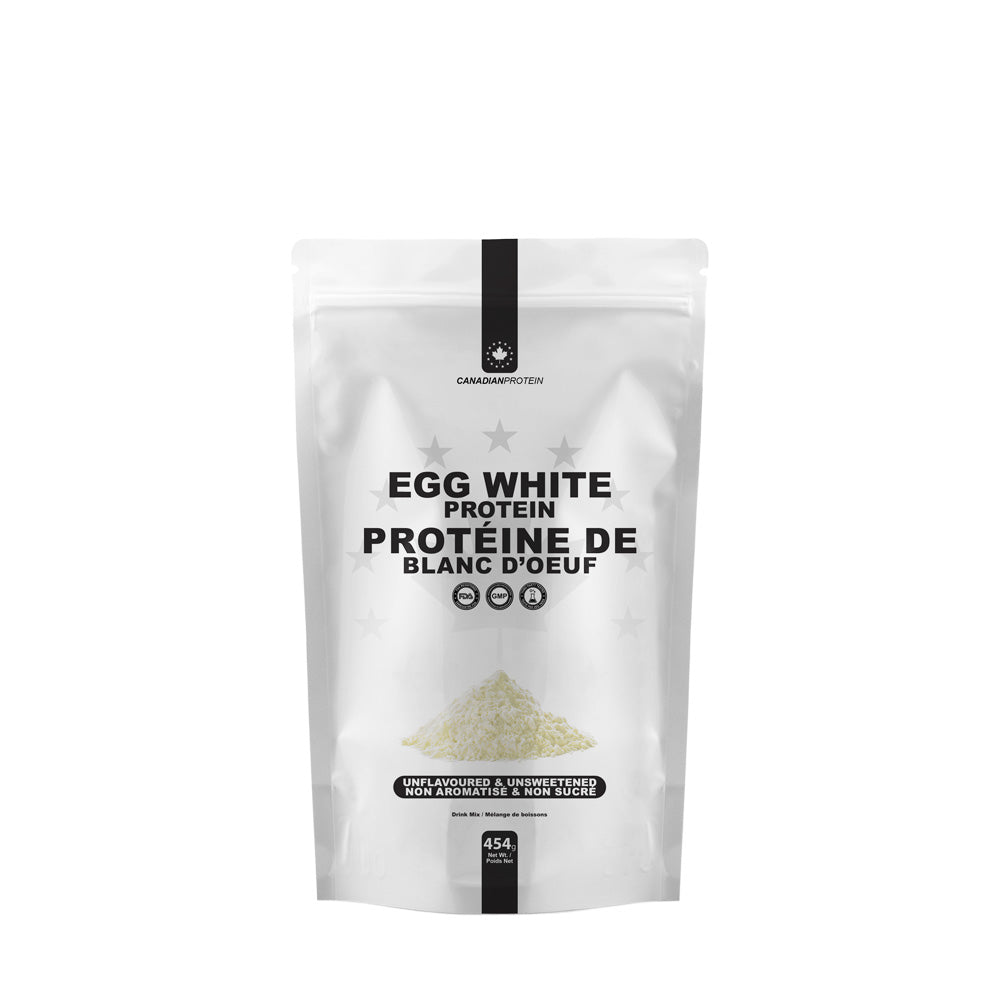
Egg White Protein Powder
Description
Dairy-free Egg White Protein Powder is considered to be the finest quality protein powder as it is found to provide a complete amino acid profile. Egg white proteins are also digested at a moderate speed which keeps muscle protein synthesis going for several hours after the protein has been consumed. The eggs are sourced locally here in Canada. Read the full product description for more information.
Contents
- 1 What is Egg White Protein?
- 2 How does it work?
- 3 What are the benefits of using Egg White Protein?
- 3.1 Muscle growth
- 3.2 Rich in amino acid
- 3.3 Great alternative to dairy
- 4 How and when should it be consumed?
- 5 Egg White Protein VS Whey Protein
- 6 Nutrition facts
- 7 What can it be stacked with?
- 8 Potential side effects
- 9 Egg White Protein Powder Reviews
- 10 Warnings
What is Egg White Protein?
Egg white protein is, not surprisingly, a protein powder supplement that has been derived from top quality egg whites. The protein that comes from egg whites is considered to be of the finest quality, with many people actually choosing egg white protein over slightly more conventional protein supplements such as whey protein. One of the reasons for this is the fact that the egg white proteins have been found to provide a complete amino acid profile, proving both essential, and non-essential amino acids. The egg white powder is spray dried, it is carefully filtered and processed, and it is very convenient as well, especially if you cannot consume diary produce.
How does it work?
Egg white protein powder works in virtually the same way as other forms of protein in the body. It contributes towards hormone regulation, it promotes cellular health and function, and of course, it plays a vital role in protein synthesis and the growth and repair of muscle tissue. It is not considered to be a fast digesting protein, but at the same time, it isn’t a slow digesting protein either. The proteins are digested at a moderate speed, and because of this, it is ideal for keeping muscle protein synthesis going for several hours after the protein has been consumed. The proteins and amino acids in the supplement feed and nourish the cells in the muscles, providing them with the ingredients they need to function correctly and to help keep the body in an anti-catabolic state.
What are the benefits of Egg White Protein supplements?
Some of the primary benefits associated with egg white protein, includes:
Muscle growth
Just like various other forms of protein, without protein, our bodies wouldn’t be able to grow and repair themselves after we exercise, and in general, meaning that building and maintaining muscle just wouldn’t be possible. With egg white protein however, the muscles are provided with top quality protein source that is rich in amino acids, thus helping to keep the body in an anabolic state.
Rich in amino acids
As mentioned, one of the key benefits associated with egg white protein, is the fact that the protein itself is rich in amino acids, which in turn, provide countless benefits. The egg white provides a stream of essential, and non-essential, amino acids, which promote general health and well-being in a variety of different ways.
Great alternative to dairy
As mentioned, if you suffer with allergies and food intolerances to dairy, protein supplements derived from dairy will obviously be off the table. Egg white protein is a great alternative as it is a moderate digesting protein, it is convenient, it’s rich in nutrients, and it provides a large quantity of high quality protein per serving.
Other benefits include:
- Rich in essential and non-essential amino acids
- Convenient
- Great alternative to dairy
- High quality protein content
- Promotes muscle growth and repair
- Helps regulate hormones
- Increases energy levels
- Promotes strength increases
- Low in calories
- And more...
How and when should it be consumed?
For optimal results, experts recommend 1 – 3 egg white protein shakes per day, with one serving being consumed around 30 minutes before you train. Simply add 30g to your beverage of choice, give a good shake or mix, and enjoy.
Egg White Protein VS Whey Protein
As mentioned, the main difference between whey protein and egg white protein, is the fact that whey is derived from dairy (cow’s milk) whereas egg whites come from hen’s eggs. Whey protein is a fast absorbing protein, whereas egg white protein is absorbed at a moderate rate, so it isn’t fast, but at the same time, it isn’t slow either. Egg white protein is also lower in calories and contains a few more amino acids as well.
Nutrition Facts
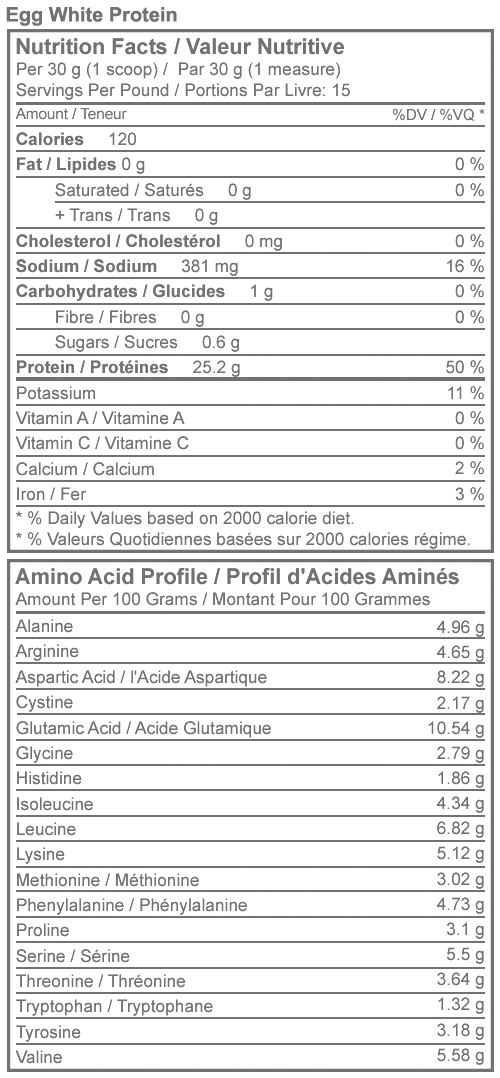
*Nutritional facts based on natural flavour. Other flavours may vary by 4-10%.
What can it be stacked with?
As this is generally a bodybuilding supplement, many bodybuilders who cannot consume dairy, will use egg white protein as their primary protein source, and will consume it along with other staple bodybuilding supplements, including: BCAAs, L-Glutamine, L-Leucine, Creatine Monohydrate , and Dextrose.
Allergen warnings
Allergy Statement: This product is made in a facility that handles milk products, gluten, shellfish, soy, peanuts and other tree nuts.
Disclaimer: The above description does not constitute medical advice and is for informational purposes only and has not been evaluated by Health Canada, CFIA, or FDA. Please consult a properly licensed medical professional before consuming nutritional supplements. This product is not intended to treat, diagnose or cure any disease.
Suggested Use
Add 1 scoop (30g) to 250-500 ml of water or other liquid and mix well. Consume within 30 minutes of preparing. You can also use it in your favourite smoothie recipe to add protein to up your protein intake.
Ingredients
Egg White (Gallus gallus, Egg)
Nutrition Facts
Nutrition Facts
Serving Size 30
Servings Per Container
| Amount Per Serving | ||
|---|---|---|
| Calories 120 | ||
| % Daily Value* | ||
| Total Fat 0g | ||
| Saturated Fat 0g | ||
| Unsaturated Fat 0g | ||
| Trans Fat 0g | ||
| Cholesterol 0mg | ||
| Sodium 381mg | 15.9% | |
| Total Carbohydrate 1g | 0.3% | |
| Dietary Fiber 0g | ||
| Sugars 1g | ||
| Protein 25g | ||
* Percent Daily Values are based on a 2,000 calorie diet. Your daily values may be higher or lower depending on your calorie needs:
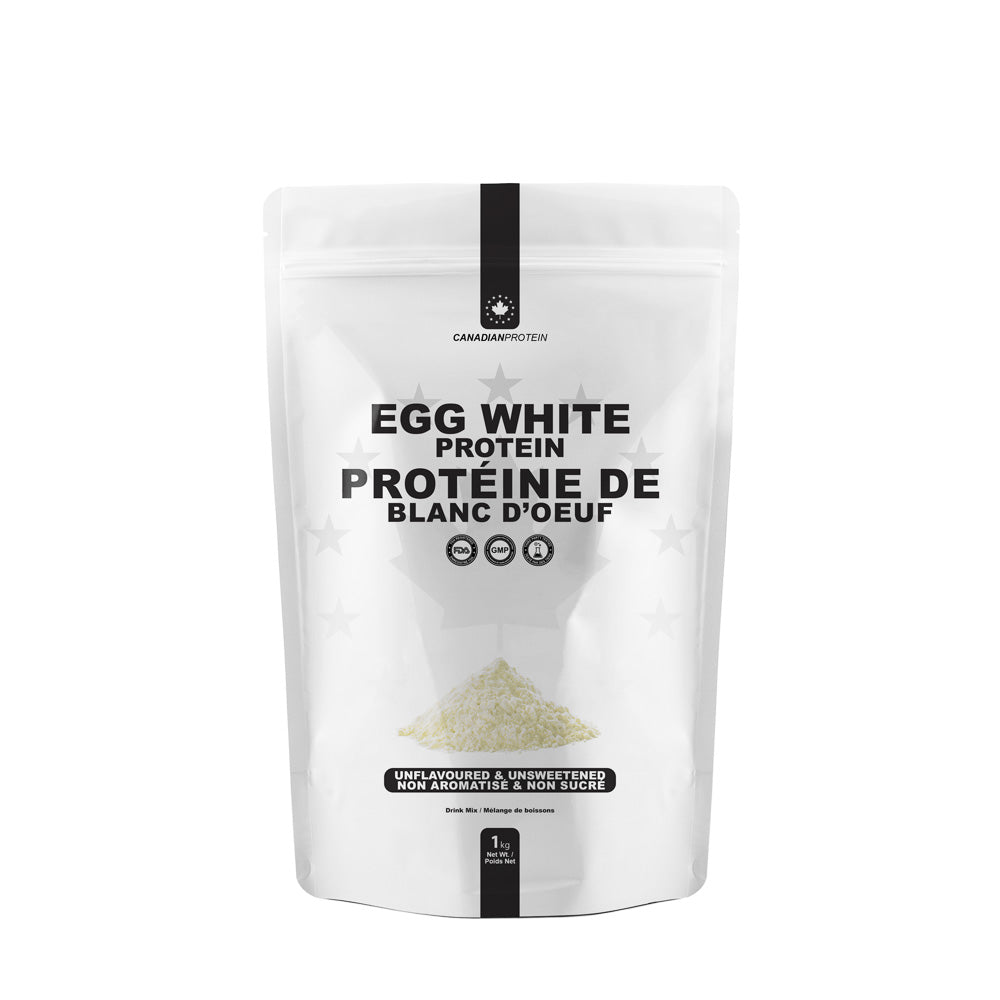

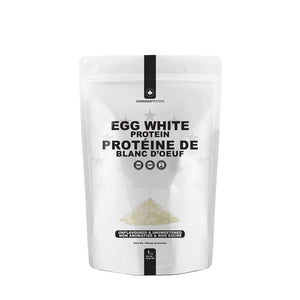
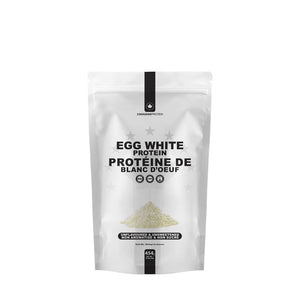
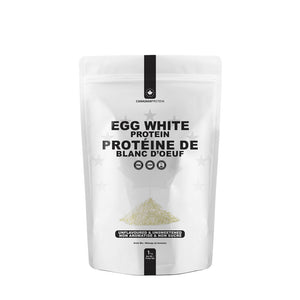
 Batch Tested for
Batch Tested for 



